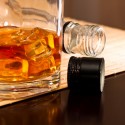Keep alcohol intake under control
When most people think about the upcoming holidays, they think about friends, family, food and good cheer. But for many people, the weeks between Thanksgiving and New Year’s are particularly difficult. Financial problems are tough to handle at any time, but they can seem overwhelming during this season of giving. Feelings of loneliness, isolation and despair may also intensify.
Unfortunately, your friend’s situation is not unusual. Many people turn to alcohol believing that it helps them to relax and to cope with stress and worry. And because many people think that New Year’s Eve and similar occasions must always be celebrated with alcohol, it’s often readily available, providing another excuse to drink.
Moderate drinking (in the absence of risk factors such as a personal or family history of alcoholism) seems to have some health benefits. Many studies have documented an association between light to moderate alcohol consumption (one to two drinks a day) and a lower risk for coronary-artery disease and the type of stroke caused by a blocked artery. For example, the National Health and Nutrition Examination Survey found this link in men, and the Nurses’ Health Study demonstrated it in women.
However, drinking larger amounts of alcohol can increase the risk of a deadly form of liver damage called cirrhosis, heart disease, some types of cancer and injuries. And even moderate drinking can have harmful consequences in the wrong setting. Certainly, no one should drink and drive, and drinking alcohol during pregnancy may harm a developing baby.
Alcohol dependence, also called alcoholism, is the most severe type of alcohol misuse. It is marked by a complete loss of control over drinking behavior. (Alcohol can activate reward pathways in the brain, motivating someone to drink more.)
Symptoms of alcohol dependence include spending a lot of time thinking about alcohol and drinking, an increased tolerance for alcohol and physiological dependence on alcohol. This means that if a person tries to stop or cut back on drinking, he or she may experience anxiety, sweating, trembling, trouble sleeping, nausea and vomiting.
Drinking can be risky even for people who aren’t dependent on it. It may interfere with sleep and productivity, strain close relationships and get in the way of spending time with loved ones.
It also puts the drinker at risk for becoming alcohol dependent as well as developing alcohol-related health problems.
Many people who suffer from a drinking problem don’t believe that anything is wrong. They may think they’re drinking to cope with a particularly stressful time. In their minds, the stress is the problem, not the drinking. They say they can stop drinking whenever they want, but they don’t. Denial is a common obstacle that prevents many people from seeking help.
To help your friend recognize his drinking problem, express your concerns in a caring way. Encourage him to get help by calling Alcoholics Anonymous at 212-870-3400 (www.alcoholics-anonymous.org) or another organization that helps people recover from alcohol dependence. You also can find information on alcohol dependence, as well as prevention and treatment programs, through the Substance Abuse and Mental Health Services Administration. Call 877-726-4727, or log on to www.samhsa.gov.
And as you plan to ring in the new year or celebrate other events, keep the following party tips in mind:
–Offer a variety of nonalcoholic beverages, such as water, sodas and fruit juice. Hold a contest to see which guest can create the tastiest nonalcoholic drink, or mocktail.
–Have plenty of food on hand, but avoid serving lots of salty snacks. Guests will spend more time at the bar if they are thirsty.
–Encourage games, activities and lively conversation. This will help people focus on having fun, not alcohol.
–Control the flow of alcohol — don’t let guests mix their own drinks. Use small glasses.
–Limit the amount of champagne or other alcohol you put in the punch bowl.
–Make sure that anyone who has been drinking has a safe ride home.
With a little planning, your party will be memorable for all the right reasons.
source: Harvard Medical School Adviser

